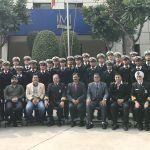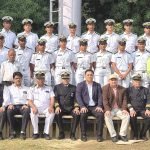
The International Maritime Institute has established itself as a leader in nautical science education. However, it does not limit itself to conventional methods of classroom education. IMI takes pride in its holistic approach that combines theoretical knowledge and hands-on experience. In this article, we will explain how the experiential learning offered by IMI bridges the gap between traditional classroom-based education and the practical demands posed by the real-world professional mariner experience.
A good professional begins with a sound education – this old saying is particularly relevant to nautical science. Students enrolling at IMI go through a structured academic process designed to instill in them a profound understanding of the foundations of maritime science. This may include such important disciplines as navigation, meteorology, oceanography, ship stability, and cargo handling. Students are taught using a mixture of lectures, independent work, and live and interactive demonstrations of theoretical principles. IMI’s faculty consists of highly professional educators and practical seafarers who incorporate actual experience into their academic activities. Students are provided with practical examples and case studies, which help them understand the importance of theoretical knowledge for their future careers.
Still, one cannot sail just on theoretical knowledge. It must be supported by practical application. This is how IMI is utilizing simulation for its activities.
Setting Sail, the final and most critical component of the IMI experiential learning program is onboard training. After undergoing comprehensive learning in the bridge and engine room simulators, students have the chance to sail on real voyages on commercial ships. This experience helps them see practically how the knowledge and skills they have acquired in the class can be put to use. In addition, having navigated the challenging weather and conducted complex emergency drills in the simulator, the students are ready to learn the principles underpinning life at sea.
The theoretical knowledge and practical skills of the students are intensified and emphasized during onboard training as they are mentored on the boats by experienced professionals. Moreover, students work in the deck and engine rooms to gain insight into operations and teamwork. Onboard training enables students to acclimate themselves to new surroundings, adjust to crew work, and acclimate themselves to the maritime industry’s rigors.
The soft training skills, such as communication and natural leadership, are emphasized in addition to the hard, technical skills. Developing these skills onboard makes the students the right candidates for crew work.
The IMI experiential program offers students the advantages of a lifetime. Upon successful completion of the 3-year IMI course, a multitude of opportunities awaits the graduates. The students can decide to specialize in the deck or the engine room where they are designated the deck officer, in charge of the navigation and safe passage of the ship. Other specializations include marine engineering to handle the maintenance and operation of machinery and cargo work or port management. Assessments, equalization, and even maritime surveying provide the other job opportunities for individuals with the IMI certificate.
The skills and knowledge one will acquire at IMI will not only be applicable while at sea. The student can expect to work at a maritime research institution or develop maritime-related policies. The student may venture further into the respective disciplines by studying oceanography or marine law. The possible career paths students can take are diverse. IMI’s program instills the requisite adaptability and flexibility, which further equips students to navigate this complex maritime grid.
IMI distinguishes itself by its dedication to experiential learning compared to other maritime education platforms. The students leave with not only the theoretical knowledge they require but also hands-on experience and the practical know-how necessary to leverage this industry. This unique approach equips them for the complex realities they will encounter once they set sail.
Take a look at IMI’s creative programmes in nautical science and get started. Get more details on how IMI is revolutionizing the maritime sector.
 IMI Students Shine at Spardha Inter-College Sports Meet
IMI Students Shine at Spardha Inter-College Sports Meet  The Caravel Group Appoints Angad Banga as Group Chief Executive Officer
The Caravel Group Appoints Angad Banga as Group Chief Executive Officer  IMI Celebrates 40 Graduating Cadets of Diploma in Nautical Sciences Batch 42 at Grand Passing-Out Ceremony
IMI Celebrates 40 Graduating Cadets of Diploma in Nautical Sciences Batch 42 at Grand Passing-Out Ceremony  Fleet Management Team Visits IMI Campus
Fleet Management Team Visits IMI Campus  Passing-Out Ceremony of ETO‑17 and GME‑42 Batches
Passing-Out Ceremony of ETO‑17 and GME‑42 Batches